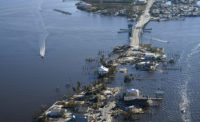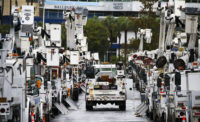Florida will need at least $33 billion in federal support to recover from Hurricane Ian, according to an emergency funding package proposed Oct. 12 by the state's Republican U.S. Senator Marco Rubio.
Under the plan, the U.S. Army Corps of Engineers would gain more than one-third of the funding, with $12 billion allocated for storm-related damage repair and rehabilitation work, as well as construction of authorized coastal storm risk management and shoreline protection, flood control and ecosystem restoration projects. Nearly $400 million would augment existing programs to reduce flood risks; improve water management flexibility to increase coastal resilience; and operations and maintenance for dredging and navigation projects affected by Hurricane Ian, as well as storm-related operating expenses.
The proposal also provides $10 billion to replenish the Federal Emergency Management Agency Disaster Recovery Fund, plus $50 million for a pilot program to elevate homes in Florida’s flood-prone areas, which would be carried out in partnership with the state government.
The U.S. Environmental Protection Agency would receive $940 million to support clean water grants to Florida communities and to address hurricane-related hazardous and solid waste management costs.
A $100-million U.S. Transportation Dept. allotment would help restore permanent access to hard-hit Pine and Sanibel Islands.
Contractors have already been selected to repair washed-out sections of the three-mile Sanibel Causeway, which took the brunt of Ian’s Category 4 storm surge when it made landfall in southwest Florida on Sept. 28. It weakened to a tropical storm as it crossed northeast across the state but regained hurricane strength in the Atlantic Ocean before striking South Carolina. By Oct. 2, the storm had dissipated into an extratropical rain event.
Estimates of total damage resulting from Ian have varied widely. Property information and analytics firm CoreLogic estimates that Ian caused between $41 billion and $70 billion in total flood and wind losses for insured and uninsured residential and commercial properties.
Major transportation infrastructure in Ian’s path sustained largely “minimal and short-lived” damage, according to financial rating firm Fitch Ratings. Toll roads, airports and ports in Florida all reopened within days of the storm’s passage, the report said, while facilities in neighboring states experienced no material disruptions or closures.
Still, Rubio said in a statement accompanying his proposed legislation that the $33 billion is only “an initial assessment” of Florida’s post-Ian recovery needs, and may well increase as these continue.
The senator has been criticized in the past for voting against a 2012 measure to provide $50 billion in disaster aid to Northeastern states following Superstorm Sandy.
Rubio justified his vote by claiming the package contained funding for unrelated projects, and vowed to do so again with any similarly crafted Hurricane Ian disaster relief bill that comes before the Senate.





Post a comment to this article
Report Abusive Comment